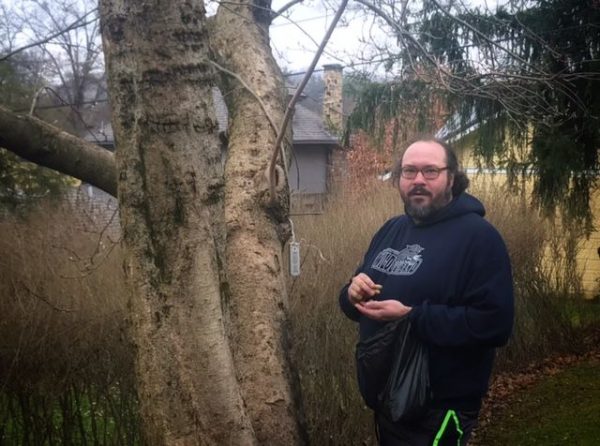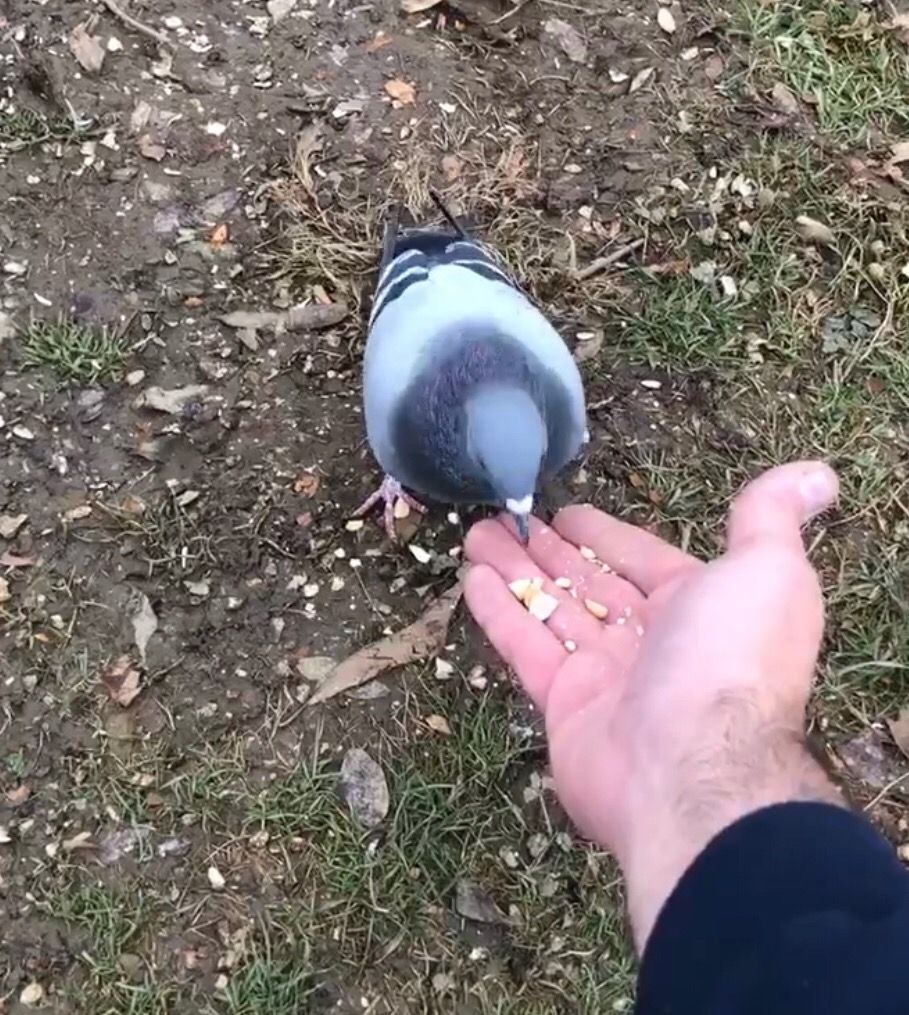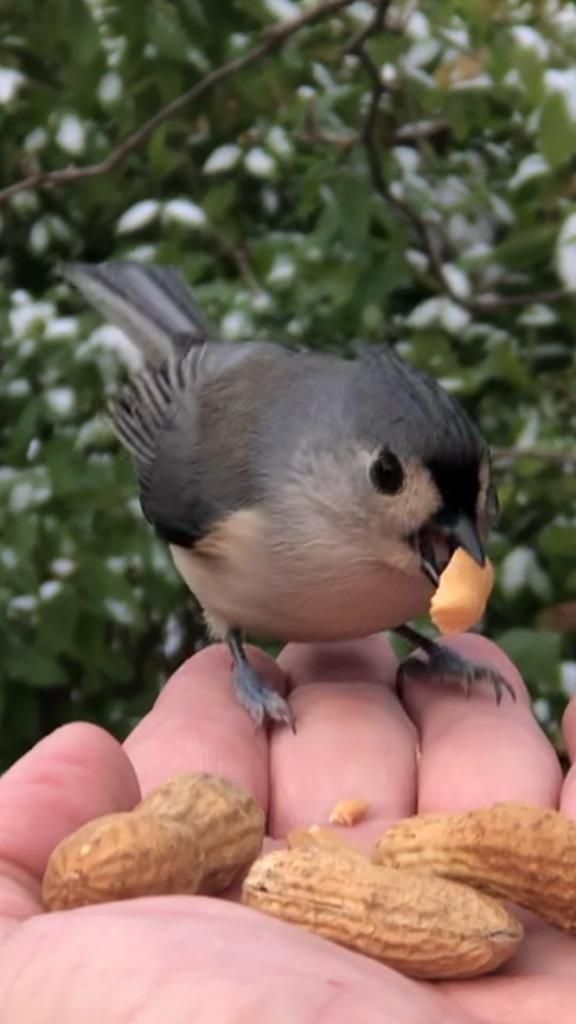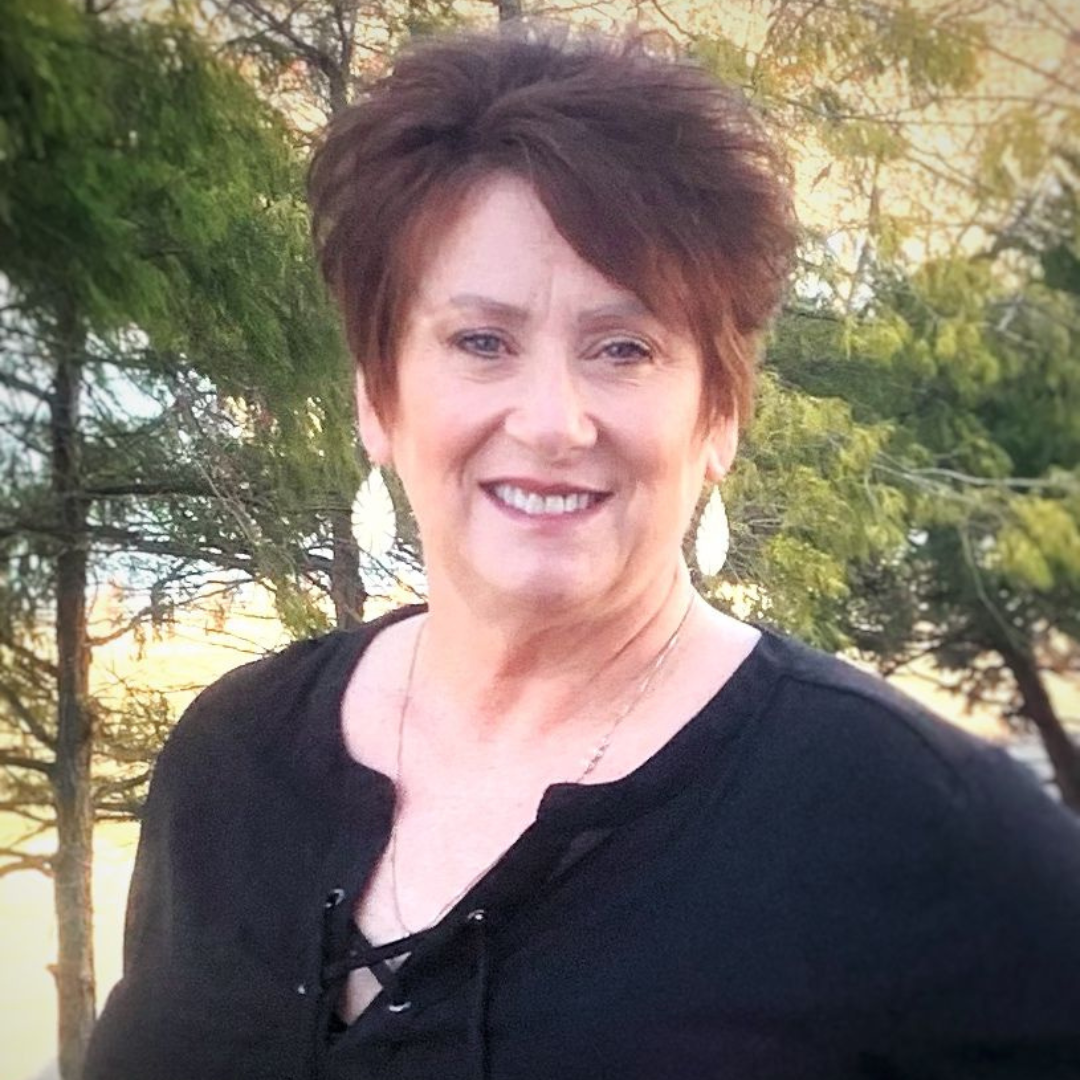Wheeling resident Joe Roxby is quickly becoming a local bird expert and wildlife citizen scientist. He offers his tips and tricks for communing with nature to Weelunk readers in the hope that his story inspires others to take a closer look at the creatures living just outside our windows.
Joe, part Doctor Doolittle with a shot of Snow White, exudes a quiet intelligence and obvious love of and respect for nature. Playing a game called “Wingspan” where players compete to attract the most birds to their virtual wildlife reserves led Joe outside to attempt to do the same in real life. “I’ve always been an animal lover,” he shares. Joe considered a career working with animals, but his solitary nature was more intrigued by the thought of becoming the sole caretaker of his own private “zoo.” And he’s done just that in his Wheeling backyard. In fact, Joe has developed the ability to feed birds, chipmunks and even a squirrel directly from his hand. It’s kind of his super-power, and it’s fascinating and charming to see.
How is this possible and how can we mere mortals hone the same skill set? Joe says it boils down to four “Ps” – patience, procedure, psychology and protocol. And according to Joe, the greatest of these is patience. (And lots of peanuts; unsalted only.)

Patience and Procedure
Joe began his nature studies in earnest last spring. He took a bag of unsalted peanuts and a lawn chair to a large tree in his yard where various bird feeders hang from branches. “The first trick is to get them to overcome their fear and eat from the feeder when you’re sitting right there,” Joe said. He sat quietly in his chair near the feeders for several hours at a time, and gradually the birds’ hunger was stronger than their fear and they began coming to the feeders despite his proximity to them. After many weeks of this ritual, (you did catch the patience part, right?) Joe began placing whole, unsalted peanuts with shells in the crooks of the tree. Before long, the birds began to snatch them and fly off the way “hangry” humans grab a burger at a drive-through. Over time, Joe moved the peanuts closer to the chair, then into his hand. Eventually his calm demeanor and tasty treats won the trust of the blue jays and titmice, who Joe says are among the braver birds in his yard.
He believes that solid, factual knowledge of birds is crucial to successfully creating and fostering an attractive habitat where they will want to gather. He recommends The Cornell Lab’s All About Birds website as a terrific resource where you can learn to identify species, calls, diseases and more. For on-the-go bird song identification, Joe also suggests downloading Cornell’s Merlin app to your phone. During our visit, Merlin identified the calls of more than a dozen birds in Joe’s suburban yard – blue jays, titmice, nuthatches, two kinds of woodpeckers, cardinals and others.
According to Joe, birds are more likely to linger if you provide suitable cover, such as bushes and trees at different height levels as well as materials such as small twigs and grasses for them to use when building nests.
Food preferences also change with the seasons as well as by species. For instance, Joe typically feeds a fruit and nut food blend, which most all birds enjoy. In the winter, he supplements this with black oil sunflower seed and suet cakes, as the birds utilize these calorie-dense foods to build up their body fat reserves as insulation against the cold. Come spring, Joe removes his feeders but continues to feed his feathered friends their peanut treats. He states that seed feeding in spring isn’t necessary as birds prefer higher-protein food such as insects when they are providing sustenance for their nestlings.
Joe is even keen on pigeons, though some may find them a nuisance. Although he shares that they are more skittish than other birds, Joe has nonetheless been successful in getting a pigeon to eat from his hand. He says that pigeons are opportunistic ground feeders and will visit feeders where they can easily knock food to the earth beneath. Joe states that they also love millet, so bear that in mind whether you are attempting to attract or avoid these feral descendants of the European rock dove.
Psychology and Protocol
Birders need to learn to see their yards through the eyes of the creatures who visit there. In addition to understanding species and sounds, Joe recommends that birders spend plenty of time outdoors getting to know the specific birds who frequent their property in order to better understand the familiar flow of the seasons and the rhythms and patterns of the natural world. He says that eventually, if you pay close attention, you will begin to notice unique behaviors and physical characteristics of individual birds, which greatly enhances the joy of birdwatching. You may even gain the ability to recognize diseases and conditions among your flock, as Joe did recently when he noticed a bird who appeared to be suffering from conjunctivitis.
Because bacteria and disease are easily spread by birds, Joe follows a strict cleanliness protocol and advises other birders to do the same. When he feeds a bird by hand, he is careful to “quarantine” that hand to that bird only and then he washes and sanitizes his hands before touching other birds, feeders or food. In addition, Joe always keeps his feeders and feeding areas clean, particularly after noticing a bird that may be diseased. The All About Birds site recommends washing feeders in the dishwasher on the hot setting, or by hand with a dilute bleach solution no stronger than 1 part bleach to 9 parts water.
Not only is birding fun and educational, but studies show that interacting with birds can have therapeutic mental health benefits. According to PsyPost, bird watching can improve your mood and well-being for hours after these encounters. Joe concurs and urges all of us to join the birds outdoors as often as possible.
“Wherever there are birds, there is hope.” – Mehmet Murat Ildan
Want more Wheeling bird content? Check out these Weelunk articles!
- The Secret Lives of Wheeling’s Pigeons
- The Backyard Chicken Keepers of Wheeling’s Past
- COMIC: Whats Up With All the Birds in North Wheeling?
- The Backyard Birds of Wheeling
• Ellen Brafford McCroskey is a lifelong resident of Wheeling and a proud graduate of Wheeling Park High School, where she discovered her love of writing as a member of the yearbook staff. She earned her bachelor’s degree in Human Resources Management at the former Wheeling Jesuit College. By day, she utilizes that degree at the international law firm where she is employed. After work, you can find her relaxing with family, friends, and her clowder of cats.






